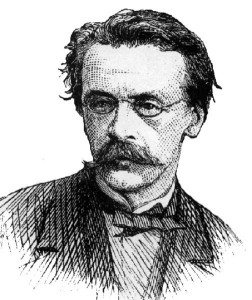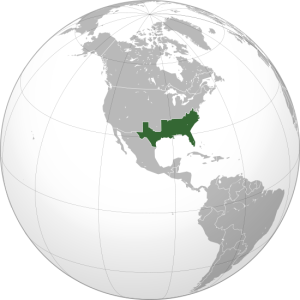150 years ago the journalist who coined the concept of Manifest Destiny was in Europe advocating the dissolution of the United States.
From the Richmond Daily Dispatch August 27, 1863:
Recognition.
–Mr. O’Sullivan, late United States Minister to Portugal, has put forth another pamphlet in London. It bears the title, “Recognition: its international legality, its justice, and its policy. A letter to Lord Palmerston.” it is an able statement of the leading arguments in favor of the recognition of the independence of the Southern Confederacy. He cites the principles which have governed European powers in recognizing nations, and applies them with conclusive force to the case of the Confederacy. He asks if there is any prospect of the subjugation of the South ? If the people of the South are united in demanding independence ? If their Government is cap maintaining order — is it, inset, a Government in fact? He contends that those of the subjugation of the Southern Southern people are unite to get rid of polit with the North–and that the Confederate Government is as constitutional and free and supported as the Government in favor of recognizing the Confederacy, and as an off act to precedents quoted by “Historians,” whose letters in the London Times against the recognition of the South attracted much notice, says.
“It is not necessary that hostilities on the part of the Northern Government should have actually ceased. (such was not the case in regard to the Swiss cantons, to the United Provinces, to Greece, to Belgium, to some of the South American States, to Texas, or (as a precedent in point for the present argument) to Hungary in 1848.”
The pamphlet is made the stronger by a forcible argument in support of State sovereignty and the right of secession, in which the American Revolutionary fathers are quoted with effect — among them occurring the names of the greatest Northern statesmen. Scouting the idea of war with the United States on account of recognition, he presses the propriety and urgency of it, on the score of both commerce and humanity. He concludes with the following warning to the noble Lord:
“But beware that your necessary eventual recognition be not too tardy to wear any aspect of grace or value in the eyes of any party or of any body on either side of the Atlantic. The general opinion of the country will both justify and applaud, and, on a word from your lips, Parliament will sanction with acclamation that recognition for which the friends of peace in America, alike at the North and at the South, now appeal to England and to Europe, as a means of peace and as the necessary precursor of peace. France is prepared, most of the other European Powers are prepared, to unite in the act.–And at the door of England, and England alone, will rest the true moral responsibility, with all its consequences, both to Europe and America, of its refusal.”
According to Wikipedia John Louis O’Sullivan used the term manifest destiny in 1845 columns urging the annexation of Texas and Oregon. He served as minister to Portugal during the 1853-1857 administration of Franklin Pierce. During the Civil War O’Sullivan wrote pamphlets in Europe supporting the Confederacy, states’ rights, and slavery.
The image of the CSA’s place in the Western Hemisphere in 1862 is licensed by Creative Commons


